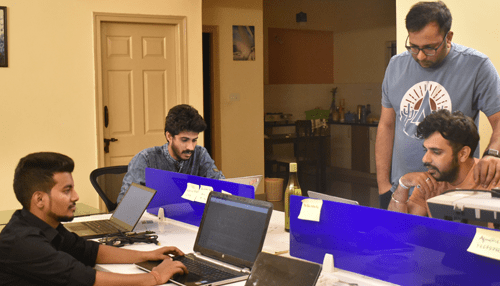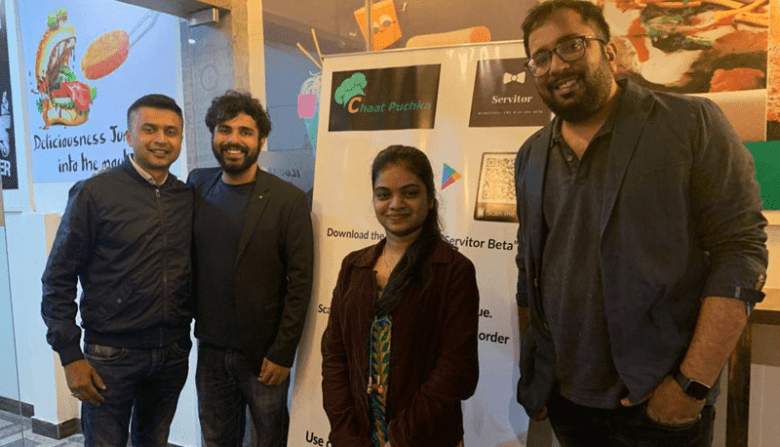After discussing with Akash, the co-founder, Pranav outlined the challenges, expanding them to different fields and potentials, shaping the company today. Servitor is one of its kind, an end-to-end solution platform to efficiently and smoothly run in-house operations at any dine-out place. Be it Fancy dine-ins, restaurants, pubs, cafeterias (corporate and private both), cafés, QSRs (Quick Service restaurants), etc. The word servitor comes from a Swedish translation of the word ‘Waiter’.
Essentially, the servicer eliminates the requirements of any waiter or middleman and saves the hassle of standing in a queue in QSRs (Quick Service Restaurants), placing an order, and then standing again in the collection queue.
It operates on a QR code module placed at each table to be scanned through the Servitor application to get the soft menu, with recommendations using our machine learning algorithms, descriptions, and ratings against each dish to place an informed order without any manual intervention. This reduces user time by 25–40% and cuts outlet labor costs by around 50%, ultimately lowering dish prices.
They have introduced multiple practical features as well to make it even more convenient for our users and increase the footfall of any outlet.
With pre-orders, users can place orders before arriving at the restaurant, enabling food preparation to start promptly. This avoids wait times and ensures hot food upon arrival. Additionally, virtual seat selection allows users to choose tables from a digital map of the restaurant. Also, in virtual seat selection, a user will be able to select a table of his choice from the virtual map of the restaurant. “One thing that we are very confident about is the split-the-check feature.
No more asking your group to pay for only what you ordered without splitting the check equally among everyone. So we are creating a seamless, end-to-end platform from the point where the user steps out of their home.” Said Team…
Pranav Vaswani and Akash Bansal co-founded this company in late ’18. During that time, we met for some work and started going out a lot for dinner and drinks in Bangalore. They noted how, especially in India, restaurants were massively understaffed. The servitor took them at least 20 minutes to place each order. They have to think about the revenue the restaurant must be losing because of the high waiting time, which keeps tables occupied for a longer time. Hence, we are losing out on new occupants.
During that time interval itself, Pranav, Co-founder, thought of a rough solution for dine-in challenges and tweeted the same (our current model) to multiple potential competitors as a suggestion.
After discussing with Akash, Pranav shaped the company today, outlining challenges across fields and potentials. Conducting surveys of restaurants and customers was the next step to understanding market requirements. They analyzed potential competitors and visited every merchant our competitor was operating with. After researching and gaining confidence in their unique product, they decided to protect their intellectual property. Therefore, I filed for the patent.
Akash Bansal is a chartered accountant by training and is in the final stage of CFA. He helped the company by setting up the first investment and by bringing more than 10 years of business expertise to the table. This helped us avoid making the mistakes that startups usually make during their initial phase and expedite our journey of Servitor. Akash has been running multiple successful ventures throughout his professional journey.
Pranav Vaswani has done his studies in Mumbai, majoring in finance and economics. Pranav was working on a cryptocurrency payment gateway. And to bring down the crypto-to-fiat currency conversion to almost 0%, making it suitable for micro and macro transactions. Pranav had worked on setting up the product and operations.
“We are currently working with 50+ merchants in Bangalore catering to 1000+ customers. We have brought down the restaurant operational cost by 35% at this stage. We are using data, to analyze the patterns and habits of customers to help in easing the operations of our partners. We have helped increase the footfall a given outlet by an average of 15-20%.” Said Team
They planned to achieve break-even by the end of 2019. To initially penetrate the market, we incurred operating losses by offering low commissions and discounts under marketing expenses. With the increasing delivery market, walk-ins are still dominated by a huge margin in India, by 70–30%. It was mostly because consumers these days have little to dispose of in their day-to-day schedule. And 64% of the total crowd is youth to start with.
The Company plans to make the process so efficient and time-saving that it attracts more walk-ins and dine-ins. The Indian restaurant sector is projected to cross $85 billion by 2022 and currently constitutes 2.1% of India’s GDP.
Message From Co-Founders
We are looking for a like-minded investor who believes in our mission and vision. Help us explore our full potential by mentoring and guiding us in the company.
To conclude, our agenda is to redefine the way people dine and tap parallel industries such as hotels, hospitality, etc.



